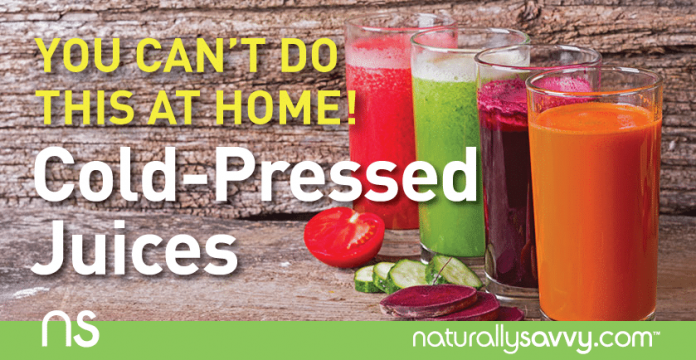
For all you
juicing enthusiasts-and the occasional juicers-carry on and use your juicers at home to
make those delicious and nutritious fruit, vegetable, and combination juices.
But if you’d like a delightful change, if you don’t have the time to make fresh
juice, or you ran out of ingredients, or you are just sick and tired of cleaning the
juicer, then cold-pressed juices may be the answer for you.
Read about juicing versus blending
The main
difference between fresh juices you make at home and cold-pressed juices
available commercially is the mind-blowing pressure that is used to prepare the juice. Here’s the deal: when you make
fresh juice at home, you pass your fruits and/or veggies through your juicer
and collect it in a glass or jar. Then you either drink your creation right
away (preferred) or store it in a glass jar and refrigerate it immediately to
help prevent oxidation and invasion by pathogens.
The
general “rule” is that juice prepared using a centrifugal juicer should be
consumed within 24 hours and those made with a masticating juicer should be
consumed within 48 hours. However, you are losing nutritional value during that
storage period. One option is to freeze your freshly made juices immediately
after making them. Freezing does cause some nutritional damage, but it’s better
than wasting all that delicious goodness!
The Birth of Cold-pressed Juices
There’s
room in the market place for a variety of fruit juice options, and cold-pressed
juices are one of them. The development of cold-pressed juices arose out of
need and desire. On the need side, the Food and Drug Administration mandated
more stringent requirements for processing unpasteurized juices after a rash of
recalls in the 1990s of such products because of contamination by E. coli and
other pathogens.
Read about what’s really in that glass of fruit juice?
When it
comes to desire, many consumers continue to want unpasteurized juices without
added sugars and preservatives and with high nutritional value. That’s when technology
finally stepped up and cold-pressed juices were born through application of
high-pressure processing, or HPP.
Cold-pressed
juices are made using hydraulic presses that press the produce through fine
mesh to extract every precious drop. Once the juice leaves the juicing process
it is bottled and sealed, and then placed in a huge chamber that is filled with
water. That’s when the mind-blowing pressure (five to 10 times the pressure
experienced by deep sea creatures) is applied to the bottles.
Similar
to pasteurization, which uses heat, high-pressure processing renders any
pathogens inactive. At the same time, it also makes the juice last for several
weeks, or as long as 45 days, rather than the few hours to two-day shelf life
of the squeeze your own fresh juice.
Pros and cons of cold-pressed juices
How does
all of this pressure impact the nutritional value of these juices? There is
some debate about this question. Some say that cold-pressed juices contain more
vitamins, minerals, and enzymes than non-cold-pressed juices, but so far there’s
not enough research to support this claim.
However,
according to Professor V.M. Balasubramaniam of the Food Science and Technology
Department at Ohio State University, all that pressure doesn’t cause any
significant damage to the product. “A carrot’s nutritional content will be very
similar before and after treatment,” he says. However, “if you look at it
microscopically, there may be changes in the cell structures.”
More
support for HPP and cold-pressed juices comes from Dr. Dallas Hoover, professor
of Food Science at University of Delaware. He explained that HPP “really
doesn’t break bonds or compounds,” and that the potency of vitamin C and other antioxidants won’t be reduced significantly.
Although
cold-pressed juices can be a great nutritional boost, don’t depend on them as
your sole source of important nutrients. Nor should you shun whole fruits and
vegetables, which provide essential fiber.
One consideration is the price tag. Some cold-pressed juices come in at $10 or $14
per serving (especially if they are organic).
Editor's Note: Cold-pressed
juices can be a convenient way to complement an otherwise healthy diet. However, if you
would prefer to forego the expensive price tag, but keep organic juices on the
menu, opt for premium pasteurized juices from our partner Uncle Matt’s Organic.
They've just launched a line of probiotic-infused organic orange juices containing turmeric and coconut.
Sources Daily
Burn. The cold-pressed truth: what juice drinkers need toknow.
MindBodyGreen.What you need to know about cold-pressed juice
US News. Cold-pressed juice, is it worth the hype?










